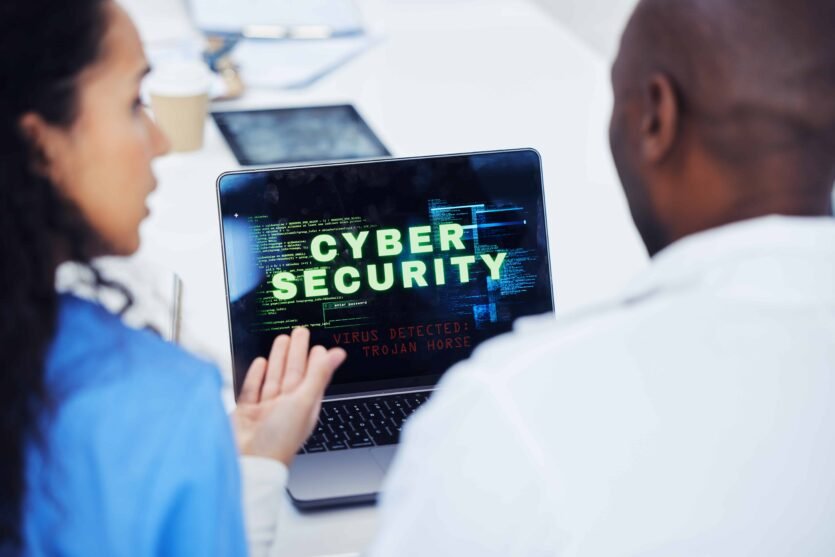Cyber Security for Small Businesses: Tips, Best Practices and Strategies

We may earn a small fee from the companies mentioned in this post.
In today’s digitally interconnected world, cyber security for small businesses is more crucial than ever. As the backbone of our economy, small businesses must take proactive measures to protect their data, customers, and IT equipment from ever-evolving cyber threats. This comprehensive guide will provide you with valuable insights, tips, and strategies to help you safeguard your business against cyber attacks and ensure its continued success.
Short Summary
Small businesses must prioritise cyber security to protect against data breaches, malware and other threats.
Developing a comprehensive strategy with employee training, risk assessments and best practices can help reduce the risks of attack.
Cyber insurance and reporting incidents to authorities are additional measures for protecting small business information from cyber attacks.
The Importance of Cyber Security for Small Businesses

Cyber security plays a critical role in protecting sensitive data, customers, and IT equipment from a wide range of cyber threats. For small businesses, the consequences of falling victim to a cyber attack or data breach can be devastating, resulting in financial losses, reputational damage, and even the loss of valuable customer trust. In fact, 73% of small businesses lack the capacity and expertise to resist a cyber security attack.
So, how can you ensure your small business is protected against cyber threats? Developing a robust cybersecurity strategy is the key to defending against the ever-growing list of cyber threats, such as phishing attacks, malware, and ransomware. The implementation of this strategy should involve employee training and awareness, regular risk assessments, and the establishment of clear policies and procedures for protecting sensitive information.
Consequences of Cyber Attacks

The consequences of a cyber attack can have a lasting impact on a small business. Financial losses can be significant, with businesses often facing the cost of recovering from the attack and the loss of revenue due to downtime. For instance, the ransomware attack against The Weather Channel in 2019 resulted in the company being taken off air for two hours, causing reputational damage and financial loss.
Beyond financial losses, data breaches can also expose sensitive information, such as customer data and financial records, to unauthorized individuals. The impact of a data breach on a small business’s reputation can be severe, as customers may lose trust in the company’s ability to protect their personal information. This loss of trust can lead to a decline in customer loyalty and may even result in customers taking their business elsewhere.
Small Business Vulnerabilities
Small businesses are particularly susceptible to cyber attacks due to their limited resources for cyber security protection. With less funds available to invest in advanced security measures, small businesses often struggle to keep up with the ever-evolving landscape of cyber threats. In addition, small businesses may lack the expertise to properly implement and maintain a comprehensive cyber security strategy.
To ensure the security of sensitive data, it is essential for small businesses to establish a plan that outlines which individuals are granted access to certain levels of information. This plan should clearly define roles and responsibilities, helping to minimize the potential consequences of a data breach and decrease the likelihood of malicious actors within the organization gaining authorized access to critical data.
Implementing a Strong Cyber Security Strategy

A strong cyber security strategy is essential for safeguarding your small business against the myriad of cyber threats that exist today. In order to develop and maintain this strategy, it is important to prioritize employee training and awareness, as well as conduct regular risk assessments. By doing so, you can ensure that your employees are equipped with the knowledge and tools they need to protect your business from cyber attacks and minimize the potential damage that could result from a security breach.
In addition to employee training and risk assessments, it is crucial to stay up to date with the latest security best practices and technologies. This includes implementing multi-factor authentication, using strong passwords, and regularly updating software and systems to protect against known security vulnerabilities. By staying vigilant and proactive in your approach to cyber security, you can greatly reduce the likelihood of your small business falling victim to a cyber attack.
Checkout our informative blog on – what a cyber attack means
Employee Training and Awareness
Employee training and awareness are essential components of a successful cyber security strategy. By ensuring that your employees are well-versed in safe internet practices and know what to look for in terms of potential cyber threats, you can significantly reduce the risk of a cyber attack. Furthermore, establishing clear policies and procedures for handling and protecting customer information and other vital data can help minimise the potential consequences of a data breach.
Training employees on cyber security fundamentals, such as locking computers when not in use, regularly changing passwords, and avoiding opening suspicious files or links, can greatly reduce the likelihood of employee-initiated attacks. In addition, it is important to establish reporting procedures for lost or stolen equipment and to ensure that employees are aware of these procedures in order to mitigate the risk of data compromise.
Regular Risk Assessments
Conducting regular risk assessments is a crucial aspect of a successful cyber security strategy. These assessments involve identifying potential hazards and evaluating the probability and impact of those risks in order to fulfill your statutory duty and enhance workplace health and safety. In the context of cyber security, this includes identifying where and how data is stored, who has access to it, and who may attempt to access it.
The information collected during a risk assessment should be used to formulate or refine your security strategy, which should be evaluated and revised periodically and when changes are implemented to information storage and usage. By regularly assessing and addressing potential risks, you can ensure that your small business is better prepared to handle cyber threats and minimize the impact of a security breach.
Beware of scammers on Vinted, checkout our informative blog and learn how to protect yourself
Essential Cyber Security Measures

Implementing essential cyber security measures can greatly reduce the likelihood of a cyber attack and help protect sensitive data from unauthorized access. These measures include antivirus and firewall protection, regular software and system updates, and data backup and encryption. By employing these security measures, you can ensure that your small business is protected against common threats and minimize the potential impact of a security breach.
Keep in mind that no single security measure can provide complete protection against all cyber threats. Therefore, it is crucial to take a comprehensive approach to cyber security by implementing multiple layers of protection, including employee training and awareness, risk assessments, and the implementation of security best practices and technologies such as multi-factor authentication and strong passwords.
Antivirus and Firewall Protection
Antivirus software is critical for small businesses to safeguard their devices from viruses, spyware, ransomware, and phishing scams. By regularly updating your antivirus software, you can ensure that your devices are protected against the most recent cyber threats and patch any security flaws. In addition, it is important to select reputable antivirus software that provides both protection and the ability to clean devices and reset them to their original state prior to infection.
Firewalls, on the other hand, are essential for protecting data on a private network from unauthorized access. To ensure that your internet connection is secure, enable the firewall of your operating system or install free firewall software from the web. If your employees work remotely, make sure their home systems have a firewall in place to protect against cyber threats and unauthorized access to your corporate network.
Software and System Updates
Keeping your software and system updates current is crucial for maintaining the security of your small business’s devices and networks. Outdated software may contain security vulnerabilities that can be exploited by cyber criminals, potentially putting your sensitive data at risk. Regularly updating your software and systems can help protect against known security vulnerabilities and ensure that your devices are running optimally.
Failing to update your software can leave your devices and networks exposed to cyber security risks. To minimize these risks, it is important to establish a regular schedule for updating your software and systems. In addition, ensure that your employees are aware of the importance of keeping their devices up to date and encourage them to regularly check for and install available updates.
Data Backup and Encryption
Data backup and encryption are essential components of a comprehensive cyber security strategy. Backing up your data regularly can help protect your small business from the potential consequences of a cyber attack, such as data compromise or deletion. Without backups, many businesses would be unable to continue functioning in the aftermath of a cyber attack.
Encryption, on the other hand, ensures data security by transforming information on your devices into unreadable codes. This helps protect sensitive information, such as customer data and financial records, from unauthorized access. It is especially important for small businesses dealing with confidential information, such as credit card and bank account details.
To further safeguard your data, consider storing copies of your backups offline to prevent encryption or loss of access in the event of a ransomware attack.
Checkout our informative article on ‘7 types of cyber security threats’
Securing Remote Work and Mobile Devices

With the rise of remote work and the increasing reliance on mobile devices in the workplace, securing remote work and mobile devices has become increasingly important for small businesses. Mobile devices pose a threat to security. Especially if they carry privileged information or connect to your business network. To ensure the security of these devices, employees should be encouraged to password-protect their devices, install security apps, and encrypt their data to protect against malicious actors attempting to access information while their devices are connected to public networks.
In addition to securing mobile devices, it is important to establish reporting procedures for lost or stolen equipment and ensure that your employees are aware of these procedures. Taking these steps can help mitigate the risk of data compromise and protect your small business from potential cyber threats.
For additional information read our guide to secure home working environments
Virtual Private Networks (VPNs)
Virtual Private Networks (VPNs) are an essential tool for small businesses, providing an additional layer of security for data and communications, as well as enabling employees to securely access the company’s network from remote locations. By creating a secure and private connection between a computing device and a computer network, VPNs encrypt the traffic between the user and the network, making it difficult for any third-party to intercept or eavesdrop on the communication.
In order to successfully configure a VPN, it is important to configure the network settings on both the server and client computers, as well as set up a secure tunnel between the two. This can be done either manually or with the assistance of a VPN service provider.
To ensure optimal utilization of a VPN, it is recommended to use strong passwords, enable two-factor authentication, and regularly update the VPN software.
Mobile Device Management
Mobile device management (MDM) is a critical element of any organisation’s security plan. It enables IT departments to automate, control, and secure policies on mobile devices, ensuring that all devices are secure and adhere to the organization’s security protocols. Implementing a secure mobile device management platform, establishing device access controls, and regularly auditing devices for security threats are all essential components of effective mobile device management.
By implementing comprehensive MDM measures, small businesses can better protect their sensitive information and corporate networks from potential cyber threats. Ensuring that all mobile devices are secure and up to date with the latest security patches and software updates is crucial for safeguarding your business from cyber attacks and minimizing the potential impact of a security breach.
Check out our informative blog on the best motorhome SatNav
Third-Party Security Considerations

As small businesses increasingly rely on third-party vendors for various services and support, it is important to consider the potential security risks associated with engaging these vendors. Third-party security considerations should be an integral part of your overall cyber security strategy, and include vendor risk assessment and incident response planning.
By evaluating the risks associated with your third-party vendors and developing appropriate policies and procedures to mitigate these risks, you can better protect your sensitive data and corporate networks from potential cyber threats. Additionally, having a well-defined incident response plan in place can help minimize the impact of a cyber attack involving a third-party vendor and ensure a swift and effective response to any security breaches.
Vendor Risk Assessment
Vendor risk assessment is the process of identifying and evaluating potential risks associated with working with third-party vendors, such as suppliers or service providers. This process is essential for understanding and mitigating the risks associated with working with these vendors, particularly when they manage critical business functions, access confidential customer data, and/or interact with customers.
To effectively evaluate vendor risk, it is recommended to conduct due diligence on vendors, establish clear contracts and service level agreements, and monitor vendors regularly for changes in their operations or services. Furthermore, organizations should ensure that vendors have appropriate security measures in place to protect customer data and comply with relevant industry regulations and standards.
Incident Response Planning
Incident response planning is a crucial aspect of cyber security, ensuring that your business is prepared to address a cyber attack and reduce the impact of any potential security breaches. An effective incident response plan should include identifying key contacts, establishing escalation criteria, constructing a flowchart or process, and establishing a conference number.
In order to maintain a robust incident response plan, it is important to create a detailed plan, test it regularly, train employees on it, and update it regularly. By having a well-defined and regularly updated incident response plan in place, you can ensure that your small business is better prepared to handle cyber threats and minimize the impact of a security breach.
Cyber Insurance and Reporting Cyber Crimes

Cyber insurance can provide small businesses with valuable protection against cyber threats, helping to mitigate the potential financial and reputational damage caused by cyber attacks and data breaches. In addition to implementing a comprehensive cyber security strategy, obtaining cyber insurance can provide an added layer of protection for your small business.
Reporting cyber crimes is another important aspect of safeguarding your small business from cyber threats. Depending on the type of crime, it may be necessary to report it to the police, the FBI, or other law enforcement agencies. By reporting cyber crimes, you can help raise awareness of the issue and contribute to the ongoing efforts to combat cyber threats and protect other small businesses from falling victim to similar attacks.
Benefits of Cyber Insurance
Cyber insurance provides a range of benefits for small businesses, including protection for risks that are generally not included in regular commercial liability policies, such as those related to malicious cyber incidents, data breaches, social engineering, business interruption, revenue loss, equipment damage, and more.
In addition, cyber insurance can offer complimentary services to assist in safeguarding your small business from potential data breach incidents. By obtaining cyber insurance, you can help ensure that your small business is better protected against the ever-evolving landscape of cyber threats.
This added layer of protection can provide peace of mind and help you focus on growing your business, knowing that you have taken proactive measures to safeguard your sensitive data and IT equipment.
Reporting Cyber Crimes
In the event that your small business falls victim to a cyber crime, it is important to report the incident to the appropriate authorities. Reporting cyber crimes can help raise awareness of the issue and contribute to the ongoing efforts to combat cyber threats and protect other small businesses from falling victim to similar attacks. Depending on the type of crime, it may be necessary to report it to the police, the FBI, or other law enforcement agencies.
In the UK, cyber crime should be reported to Action Fraud. This organisation will inform the National Fraud Intelligence Bureau and provide a police crime reference number. By reporting cyber crimes and taking the necessary steps to protect your small business, you can help create a safer digital landscape for all businesses and contribute to the ongoing fight against cyber crime.
Summary
In conclusion, cyber security is a critical aspect of running a successful small business in today’s digital age. By implementing a robust cyber security strategy, staying up to date with the latest security best practices and technologies, and taking proactive measures such as obtaining cyber insurance and reporting cyber crimes, you can help to safeguard your business against cyber threats and ensure its continued success. Remember, the key to a secure and prosperous small business lies in your hands – stay vigilant, stay informed, and stay protected.
Frequently Asked Questions
How much does cybersecurity cost for small business?
For a small business, the cost of cybersecurity can range from £150 to £500 per month depending on the size and complexity of their security infrastructure.
This relatively manageable investment in cybersecurity is well worth it, as the cost of a cyberattack can easily be much higher.
What is the most common cyber attack on small businesses?
Phishing attacks are the most common cyber attack on small businesses, and they account for a staggering 90% of all security breaches. In addition to this, these attacks have grown 65% in the last year, causing over £10 billion in damages.
Protecting yourself from phishing is essential to protect your business.
What are the best cybersecurity practices for small to medium size businesses?
To ensure maximum security for small to medium sized businesses, it is important to regularly update operating systems and applications, implement strong passwords, install anti-virus software, and educate employees on cybersecurity best practices.
Additionally, using two-factor authentication, as well as implementing a secure VPN connection, can help further protect a business from cyber threats. Taking these measures will go a long way in protecting your data and business operations from malicious attacks.
What companies need cyber security?
Every company needs cybersecurity, regardless of its size or industry. Cybersecurity solutions are essential for companies to protect their sensitive data and assets, and they should be tailored to the particular needs of the company and its industry.
By investing in suitable cybersecurity solutions, organisations can ensure their operations are kept secure and their customer data is protected.
External 3rd party links that may provide useful information for small businesses
- Federal Communications Commission: The NCSC Small Business Guide has been revamped for 2023 as well as the response and recovery guidance
- LegalZoom: Provides 5 ways to protect your small business from a cyberattack, such as updating your software and educating your employees.
- Chubb: Offers best practices for improving small business cyber security, including educating your employees and implementing safe password practices.
- Business.gov.au: Gives advice on backing up your data, securing your devices and network, and encrypting important information.
With over three decades of experience in the heart of London’s financial sector, I have dedicated my career to the pursuit of robust cybersecurity practices and IT leadership. As a Certified Information Systems Security Professional (CISSP), Certified Information Security Manager (CISM), Certified Chief Information Security Officer (C|CISO), Certified Ethical Hacker (CEH), and Computer Hacking Forensic Investigator (CHFI), I bring a wealth of knowledge and expertise to the table.
My journey in the field of cybersecurity has not only been about personal growth but also about sharing my insights with others. As an international speaker, I have had the privilege of addressing audiences worldwide, discussing the importance of cybersecurity in today’s digital age. My passion for knowledge sharing extends to my work as an author and blogger, where I delve into the complexities of cybersecurity, offering practical advice and thought leadership.
In my role as a CISO and Head of IT, I have overseen the development and implementation of comprehensive information security and IT strategies. My focus has always been on creating resilient systems capable of withstanding the evolving landscape of cyber threats.
My Master’s degree in Cybersecurity has provided a solid academic foundation, which, when combined with my practical experience, allows me to approach cybersecurity from a holistic perspective.
I am always open to connecting with other professionals in the field, sharing knowledge, and exploring new opportunities. Let’s secure the digital world together.

